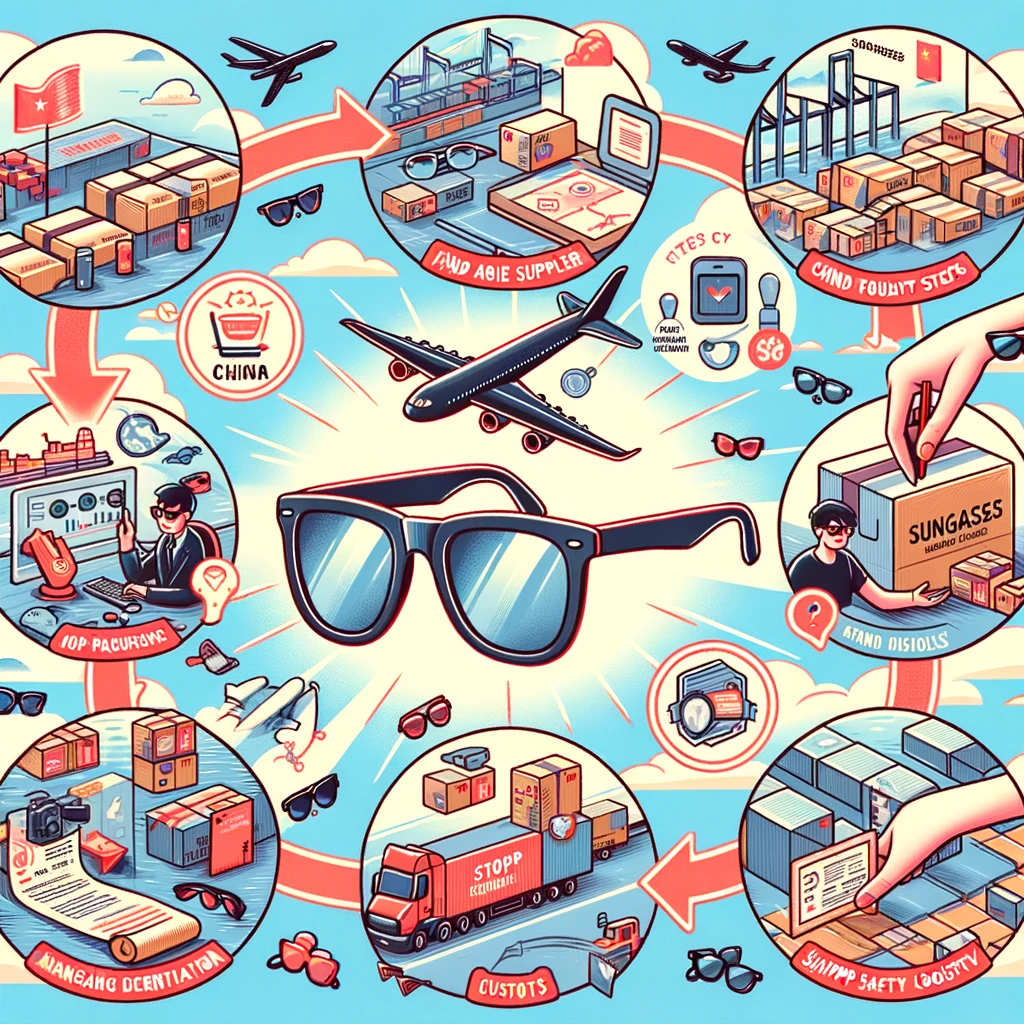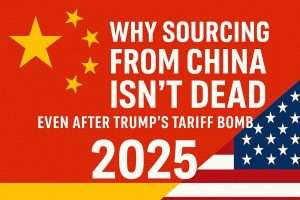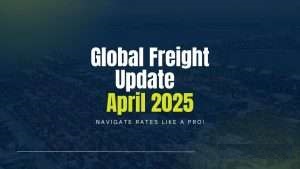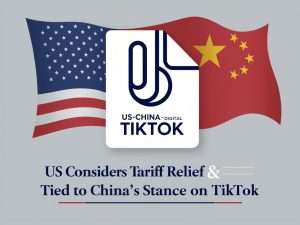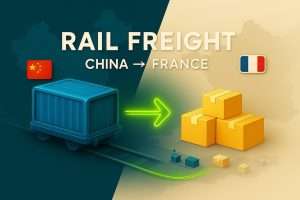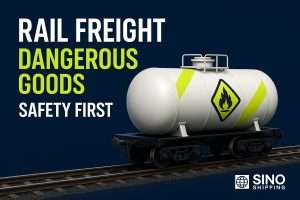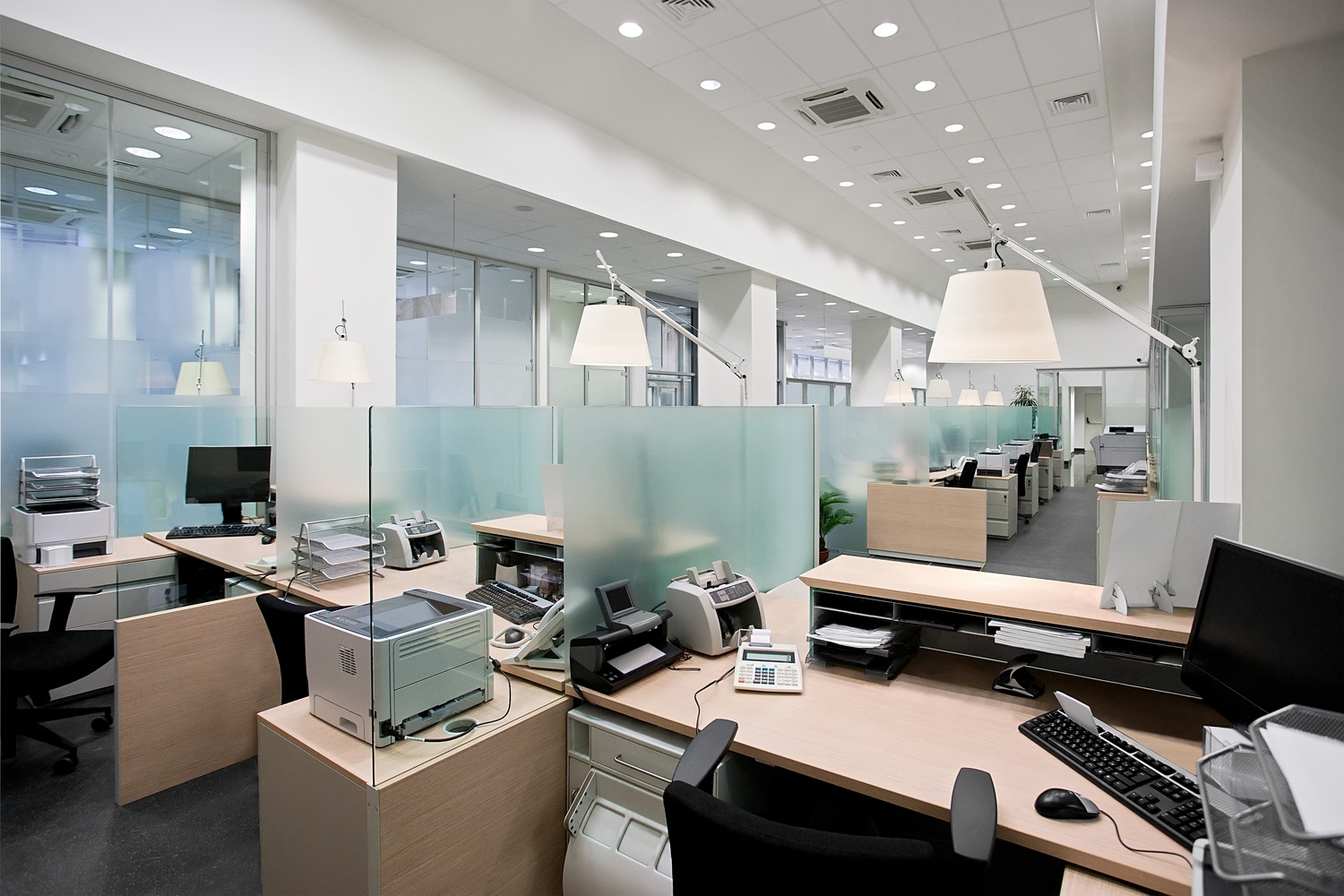Introduction
Thinking of importing sunglasses from China? This venture is both promising and challenging. In this guide, we’ll cover key areas: customs regulations, finding reliable suppliers, and ensuring product quality. Whether you’re a beginner or an experienced importer, understanding these aspects is crucial for success.
Navigating Customs Regulations
Grasping the customs rules is vital for a smooth import process. It impacts costs, legal compliance, and efficiency. We’ll explore how to navigate these regulations effectively.
Selecting Reliable Suppliers
Choosing the right supplier is critical. We’ll discuss how to identify partners who meet your quality standards and business values in China’s vast supplier network.
Prioritizing Quality
Quality is non-negotiable. We’ll delve into international standards like CE and FDA, essential for maintaining customer trust and legal compliance.
Understanding Customs Regulations for Chinese Sunglasses

Ever wondered why customs regulations are pivotal in importing sunglasses from China? Navigating these rules is not just about compliance; it’s about optimizing costs and ensuring a smooth import journey. Let’s break down the essentials of customs regulations that every importer must know.
Overview of Customs Duties and Taxes
Understanding customs duties and taxes is a cornerstone of import success. These vary by country and can significantly impact the total cost of your shipment. For instance, the EU imposes a standard rate, while the U.S. has varying rates based on product categories. We’ll explore how to calculate these costs and incorporate them into your pricing strategy.
Specific Regulations for Importing Sunglasses
Importing sunglasses comes with its own set of specific regulations. These might include safety standards, labeling requirements, and even anti-dumping duties in certain countries. For example, the EU requires CE marking for safety, while the U.S. demands compliance with ANSI standards. Familiarizing yourself with these nuances is key to avoiding customs delays and penalties.
Finding Reliable Sunglasses Suppliers in China

How do you ensure that you’re partnering with a reliable sunglasses supplier in China? The key lies in thorough research and strategic selection. In this segment, we’ll dive into effective methods for identifying and vetting suppliers who can meet your standards and contribute to your business success.
Using B2B Platforms
B2B platforms like Alibaba and Global Sources have revolutionized the way businesses find suppliers. These platforms provide a vast array of options, complete with supplier profiles, customer reviews, and past transaction histories. However, it’s vital to look beyond the surface. We recommend conducting detailed supplier audits and communicating directly to assess their capabilities and reliability. For instance, verifying a supplier’s business license and production capacity can offer insights into their operational credibility.
Attending Trade Fairs
Trade fairs offer a unique opportunity to meet suppliers face-to-face. Events like the Canton Fair or the Hong Kong Optical Fair are hotspots for finding quality sunglasses manufacturers. Here, you can evaluate products firsthand, negotiate terms directly, and build relationships. An added advantage is the chance to spot industry trends and innovations. For example, attending these fairs has led businesses to discover new materials and designs that later became market hits.
Quality Standards for Imported Sunglasses
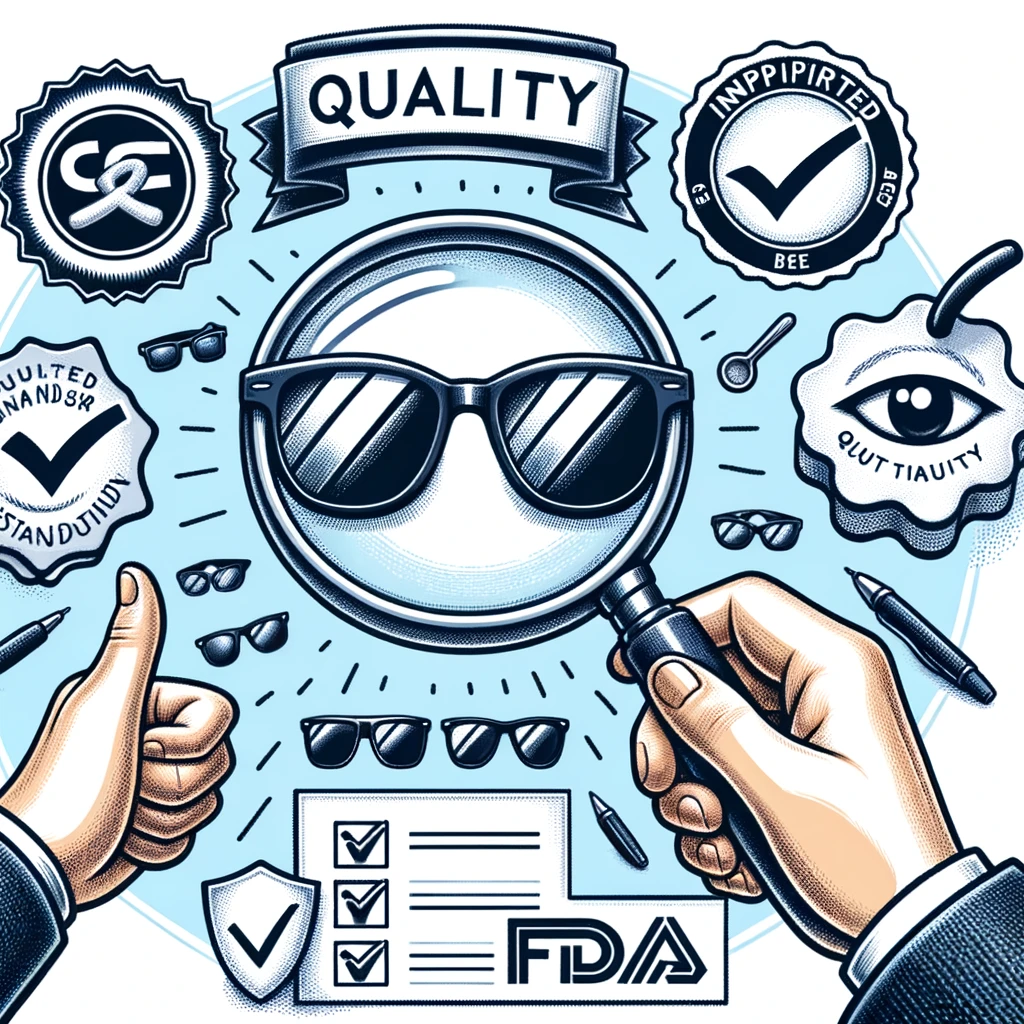
Why are quality standards critical when importing sunglasses from China? Adherence to international quality standards not only ensures product safety and customer satisfaction but also strengthens your brand’s reputation. This section will guide you through the crucial certifications and compliance strategies needed for importing high-quality sunglasses.
International Certifications (CE, FDA, ISO)
When sourcing sunglasses from China, it’s essential to look for products with international certifications like CE (European Conformity), FDA (U.S. Food and Drug Administration), and ISO (International Organization for Standardization). These certifications indicate that the products meet stringent safety and quality guidelines. For instance, the CE mark signifies that the sunglasses comply with European health, safety, and environmental protection standards, while FDA approval is critical for entry into the U.S. market. Verifying these certifications is a key step in ensuring the legitimacy and quality of the products you import.
Ensuring Compliance with Quality Standards
Beyond certifications, ensuring that your sunglasses meet consistent quality standards is paramount. This involves conducting regular quality checks and product audits. Employing third-party inspection services can be an effective way to validate compliance. These checks should cover aspects like material quality, durability, UV protection, and design accuracy. Additionally, understanding the manufacturing processes and quality control measures of your Chinese suppliers can provide deeper insights into the quality of the end product. For example, visiting the factory or requesting detailed production reports can reveal much about the supplier’s commitment to quality.
Ensuring Sunglasses Product Safety Compliance
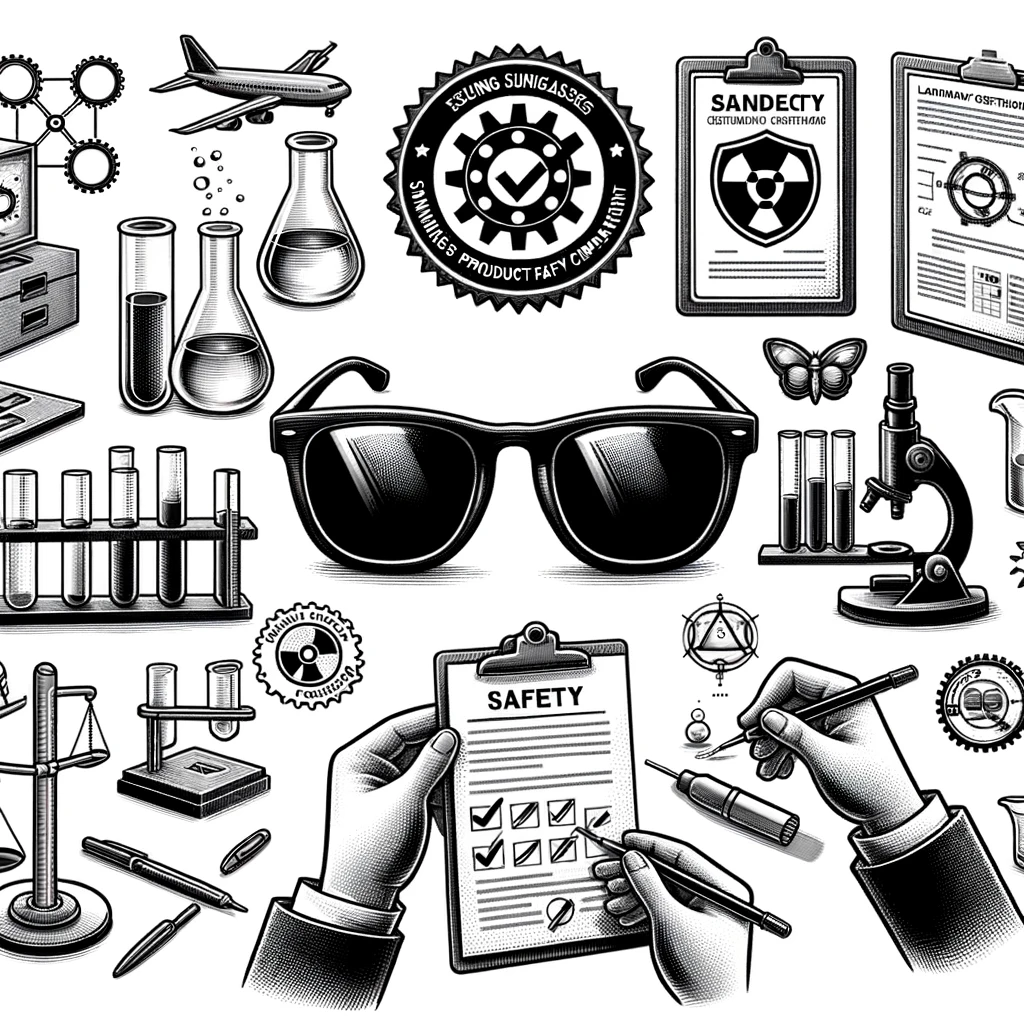
How does ensuring product safety compliance affect your sunglasses import business? In the competitive world of fashion accessories, ensuring the safety of your products is not just a regulatory necessity but a cornerstone of customer trust and brand reputation. This section emphasizes the importance of rigorous safety standards and methods to uphold them in your imports from China.
The Importance of Sampling and Testing
Sampling and testing are critical in validating the safety and quality of sunglasses. It’s not just about meeting the minimum standards; it’s about exceeding them. Implementing a robust sampling process allows you to inspect product quality firsthand before committing to a large order. This might include checking for lens clarity, frame durability, and UV protection levels. Additionally, laboratory testing can provide data on materials safety, such as lead content and BPA levels. For instance, a test report showing compliance with the ANSI Z80.3 standard (American National Standards Institute) is a strong indicator of product safety for sunglasses.
Quality and Safety Checks Before Bulk Orders
Before placing bulk orders, conducting thorough quality and safety checks is essential. This step is not just about product evaluation but also serves as a check on your supplier’s capabilities. It involves examining various aspects of the product, such as hinge strength, lens coating consistency, and overall build quality. For example, performing a drop test can assess the durability of sunglasses, an important factor for consumer satisfaction. These pre-order evaluations help in identifying and rectifying potential issues, thereby reducing the risk of customer complaints and returns.
Understanding Sunglasses Production and Shipping Timelines

Do you know how production and shipping timelines impact your sunglasses importing business? Efficiently managing these timelines is crucial for ensuring a steady supply chain and meeting market demands. In this section, we’ll explore how to effectively navigate supplier schedules and choose the best shipping options, a vital aspect of importing from China.
Navigating Supplier Production Schedules
Understanding your supplier’s production schedule is key to timely deliveries. It involves more than just knowing the manufacturing time; it’s about syncing your business needs with their capabilities. Factors like order volume, manufacturing capacity, and seasonal demands play a significant role. For instance, during Chinese New Year, production might slow down, affecting delivery times. It’s essential to plan ahead and communicate with your suppliers to ensure your orders are prioritized and timelines are met.
Shipping Options and Timelines
Selecting the right shipping method can make a significant difference in your overall cost and delivery efficiency. Options range from air freight for quick deliveries to sea freight for larger, less time-sensitive shipments. Each option has its own set of pros and cons in terms of cost, transit time, and environmental impact. For example, air freight is faster but more expensive, while sea freight is cost-effective but takes longer. Understanding these nuances helps in making informed decisions that align with your business strategy and customer expectations.
Overcoming Language and Cultural Barriers for Chinese Sunglasses Imports

Have you considered how language and cultural barriers can affect your sunglasses importing business from China? Bridging these gaps is essential for smooth transactions and building strong supplier relationships. In this segment, we’ll discuss strategies to overcome these challenges, crucial for successful international trade.
Effective Communication Strategies
Effective communication is the cornerstone of overcoming language barriers. It’s not just about speaking the same language, but also understanding the business etiquette and negotiation styles in China. For instance, using simple, clear language in emails and ensuring all terms are explicitly agreed upon can avoid misunderstandings. Additionally, being aware of cultural nuances, like the importance of relationship building in Chinese business culture, can enhance your interactions and negotiations.
Utilizing Translation Services and Local Agents
In situations where language poses a significant challenge, translation services and local agents can be invaluable. These professionals can help navigate complex conversations, translate documents accurately, and ensure legal and business compliance. For example, a local agent with knowledge of the sunglasses market can assist in identifying credible suppliers and negotiating favorable terms. They can also provide insights into local market trends and consumer preferences, giving you a competitive edge.
Uncovering Hidden Costs in the Sunglasses Import Process
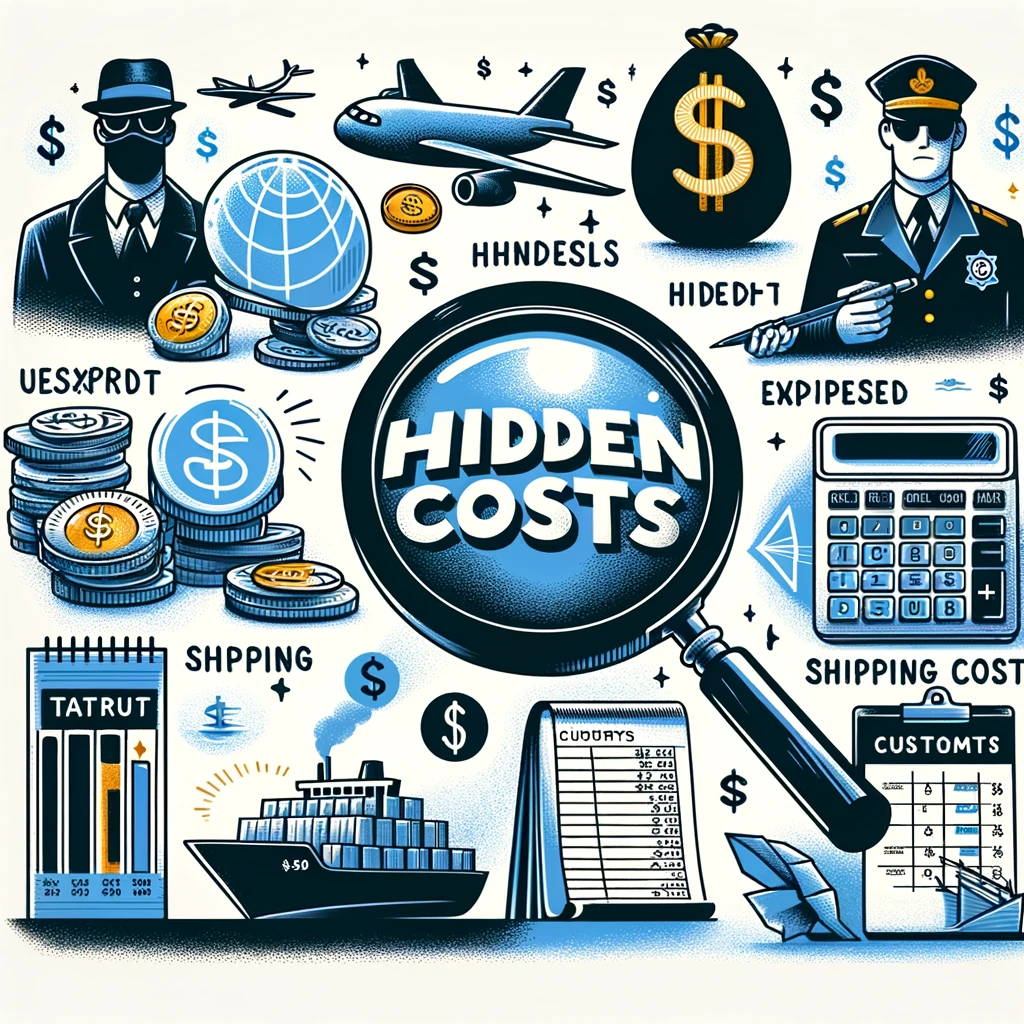
Are you aware of the hidden costs that can surface when importing sunglasses from China? Recognizing and preparing for these costs is crucial for maintaining your budget and ensuring profitability. Let’s uncover the often-overlooked expenses that can impact your bottom line.
Transportation, Insurance, and Storage Costs
In the world of international trade, costs extend beyond the price of goods. Transportation, insurance, and storage are significant factors that can affect your total expenditure. For instance, the choice between air and sea freight not only impacts delivery time but also transportation costs. Insurance is vital to protect your goods against loss or damage, adding to the cost. Additionally, storage costs, both at the port and in warehouses, can accumulate, especially if there are delays in customs clearance or distribution.
Managing Potential Penalties and Delays
Unexpected penalties and delays can also add to the cost of importing. These can arise from various sources, such as non-compliance with customs regulations, documentation errors, or supplier issues. For example, failure to comply with import regulations can result in fines or even confiscation of goods. Delays, on the other hand, can lead to increased storage fees and missed market opportunities. Anticipating these scenarios and planning accordingly can help in minimizing their financial impact.
Managing Large Sunglasses Orders and Quality Control

How do you effectively manage large orders and maintain quality control when importing sunglasses from China? This is a critical question for businesses aiming to scale up while ensuring product consistency. In this part, we’ll explore strategies to manage large-scale orders and uphold quality standards.
Establishing Clear Agreements with Suppliers
When dealing with large orders, clear and detailed agreements with your suppliers are essential. These agreements should cover all aspects of production, including quality specifications, production timelines, and delivery schedules. For instance, specifying the materials, design details, and packaging requirements in the contract helps in maintaining consistency. It’s also vital to agree on the quantity tolerances and payment terms to avoid future disputes. Regular communication and clear documentation can prevent misunderstandings and ensure both parties are aligned with the expectations.
Pre-shipment Product Inspection
Pre-shipment inspection is a crucial step in quality control, especially for large orders. This involves checking a representative sample of the products before they leave the factory. Inspections should focus on product functionality, aesthetic aspects, and compliance with the agreed specifications. For example, checking the UV protection level of sunglass lenses or the durability of the frames ensures that the products meet your standards. Employing an independent third-party inspection service can provide an unbiased assessment, giving you confidence in the quality of your shipment.
Secure Payment Options for International Transactions
What are the best practices for secure financial transactions when importing sunglasses from China? Navigating the complexities of international payments requires knowledge of reliable and secure methods. This section focuses on effective payment options and strategies to safeguard your financial interests.
Letters of Credit, PayPal, and Bank Transfers
Choosing the right payment method is crucial for international trade. Letters of Credit (LCs) are widely used in international transactions due to their security for both buyers and sellers. They ensure payment is made only when the terms of the LC are met. PayPal and bank transfers are other popular options. PayPal offers convenience and some level of buyer protection, while bank transfers are preferred for their directness and wide acceptance. For example, using a Letter of Credit for large shipments can minimize the risk of non-payment, while PayPal can be suitable for smaller transactions or samples.
Safeguarding Financial Transactions
Beyond choosing a payment method, it’s important to safeguard your financial transactions. This involves verifying the legitimacy of the supplier, understanding the terms and conditions of the payment method, and being aware of any potential fees or charges. Implementing measures like due diligence checks and contractual agreements can provide additional security. For instance, using escrow services for bank transfers adds a layer of protection, ensuring that funds are released only when both parties fulfill their contractual obligations.
Handling Returns and Quality Issues
How do you effectively manage returns and address quality issues in sunglasses imports from China? This is a crucial aspect for maintaining customer satisfaction and safeguarding your brand’s reputation. Here, we’ll explore strategies for establishing robust return policies and dealing with post-delivery quality discrepancies.
Establishing a Return and Refund Policy
Having a clear return and refund policy is essential for any import business. This policy should be comprehensive, outlining the conditions under which returns are accepted and the process for refunds or replacements. It’s important to balance being fair to your customers and protecting your business from potential abuses. For instance, stipulating a time frame for returns and requiring proof of defects can help manage this process effectively. Clearly communicating this policy to your customers and suppliers ensures transparency and helps in building trust.
Dealing with Quality Discrepancies Post-Delivery
When faced with quality discrepancies after delivery, having a systematic approach is key. This could involve steps like assessing the extent of the issue, communicating with the supplier for potential solutions, and deciding on the best course of action, such as returns, repairs, or refunds. For example, if a batch of sunglasses has minor quality issues, negotiating a discount with the supplier might be more feasible than returning the entire batch. It’s important to document all communications and agreements as a reference for future resolutions.
Conclusion
Ready to embark on your journey of importing sunglasses from China? This comprehensive guide has equipped you with the knowledge and strategies to navigate the complex yet rewarding world of international trade. Let’s recap the key points and set the stage for your success.
In our journey, we explored the importance of understanding customs regulations and the need for finding reliable suppliers. We delved into the critical aspects of quality standards and the necessity of ensuring product safety compliance. The discussion on managing production and shipping timelines highlighted the importance of planning and flexibility.
We also addressed the challenges of overcoming language and cultural barriers, uncovering hidden costs, and the importance of managing large orders with a focus on quality control. Secure payment methods and the handling of returns and quality issues were also key topics that play a significant role in the success of your importing venture.
As you move forward, remember that each step in this process is an opportunity to learn and grow. With the right approach, diligence, and the insights from this guide, you are well on your way to becoming a successful importer of sunglasses from China. Embrace the challenges, seize the opportunities, and let your business flourish in the global market!
Frequently Asked Questions (FAQs)
What are the key factors to consider when importing sunglasses from China?
When importing sunglasses from China, several key factors need consideration. Firstly, understand the customs regulations and import duties in your country. Secondly, finding a reliable supplier is crucial – this involves checking their credibility, production capacity, and quality standards. Additionally, be aware of the quality standards and safety certifications required for sunglasses, such as CE, FDA, or ISO. Lastly, factor in the logistics - including shipping methods, costs, and timelines.
How can I ensure the quality and safety of sunglasses purchased from Chinese suppliers?
To ensure the quality and safety of sunglasses, start by selecting suppliers with a good track record and necessary certifications like CE, FDA, or ISO. Conduct due diligence by reviewing factory audits, product samples, and testing reports. Implement quality control processes, such as pre-shipment inspections or third-party testing, to verify product standards. Regular communication with suppliers about your quality expectations is also key.
What are the typical shipping times and costs associated with importing from China?
Shipping times and costs vary based on the mode of transportation and the distance. Air freight is faster but more expensive, typically taking about 1-2 weeks, while sea freight is cost-effective but takes longer, usually around 4-6 weeks. Costs will vary depending on the weight and volume of the shipment, the specific carrier, and the current market conditions. It's essential to get quotes from multiple logistics providers to find the best balance between cost and speed.
How do I handle communication challenges with Chinese suppliers?
Effective communication with Chinese suppliers can be managed by using clear and simple language, and confirming understanding on both sides. Utilize translation services if necessary. Understanding cultural differences and business etiquettes is also crucial. Building a relationship over time helps, and using a local agent or intermediary can be beneficial in bridging any communication gaps.
What should I do if the sunglasses received do not meet the agreed-upon standards?
If the sunglasses do not meet the agreed standards, first document all discrepancies with photographic evidence. Contact the supplier immediately to discuss the issues and negotiate a resolution, which could include replacements, refunds, or a discount on future orders. Ensure your agreement includes a clear return and refund policy for such situations. If disputes arise, refer to your contract and consider seeking legal advice.

